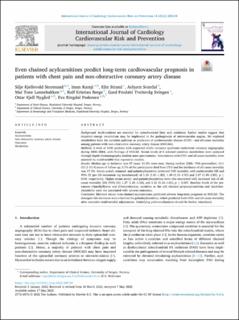| dc.contributor.author | Storesund, Silje Kjellevold | |
| dc.contributor.author | Karaji, Iman | |
| dc.contributor.author | Strand, Elin | |
| dc.contributor.author | Svardal, Asbjørn M. | |
| dc.contributor.author | Lønnebakken, Mai Tone | |
| dc.contributor.author | Berge, Rolf Kristian | |
| dc.contributor.author | Svingen, Gard Frodahl Tveitevåg | |
| dc.contributor.author | Nygård, Ottar Kjell | |
| dc.contributor.author | Pedersen, Eva Ringdal | |
| dc.date.accessioned | 2022-09-30T12:05:06Z | |
| dc.date.available | 2022-09-30T12:05:06Z | |
| dc.date.created | 2022-08-25T14:51:02Z | |
| dc.date.issued | 2022 | |
| dc.identifier.issn | 2772-4875 | |
| dc.identifier.uri | https://hdl.handle.net/11250/3022911 | |
| dc.description.abstract | Background
Acylcarnitines are essential for mitochondrial fatty acid oxidation. Earlier studies suggest that impaired energy metabolism may be implicated in the pathogenesis of microvascular angina. We explored metabolites from the carnitine pathway as predictors of cardiovascular disease (CVD) - and all-cause mortality among patients with non-obstructive coronary artery disease (NOCAD).
Methods
A total of 1046 patients with suspected stable coronary syndrome underwent coronary angiography during 2000–2004, with findings of NOCAD. Serum levels of 8 selected carnitine metabolites were analyzed through liquid chromatography tandem mass spectrometry. Associations with CVD- and all-cause mortality were assessed by multivariable Cox regression models.
Results
Median age at inclusion was 57 years. 51.5% were men. During median (25th- 75th percentiles), 14.1 (13.2–15.4) years of follow-up, 5.7% of the participants died from CVD and the incidence of all-cause mortality was 17.3%. Serum acetyl, octanoyl- and palmitoylcarnitine predicted CVD mortality with multivariable HR and 95% CI (per SD increment log transformed) of 1.36 (1.01–1.83), 1.49 (1.15–1.93) and 2.07 (1.49–2.85), p ≤ 0.04, respectively. Higher serum acetyl- and palmitoylcarnitines were also associated with increased risk of all-cause mortality (HR (95% CI): 1.27 (1.01–1.50), and 1.51 (1.26–1.81), p ≤ 0.007. Baseline levels of the precursors trimethyllysine and ƴ-butyrobetaine, carnitine or the odd chained propionylcarnitine and (iso)valerylcarnitine were not associated with adverse outcomes.
Conclusion
Elevated serum even-chained acylcarnitines predicted adverse long-term prognosis in NOCAD. The strongest risk estimates were observed for palmitoylcarnitine, which predicted both CVD- and all-cause mortality after extensive multivariable adjustments. Underlying pathomechanisms should be further elucidated. | en_US |
| dc.language.iso | eng | en_US |
| dc.publisher | Elsevier | en_US |
| dc.rights | Navngivelse 4.0 Internasjonal | * |
| dc.rights.uri | http://creativecommons.org/licenses/by/4.0/deed.no | * |
| dc.title | Even chained acylcarnitines predict long-term cardiovascular prognosis in patients with chest pain and non-obstructive coronary artery disease | en_US |
| dc.type | Journal article | en_US |
| dc.type | Peer reviewed | en_US |
| dc.description.version | publishedVersion | en_US |
| dc.rights.holder | Copyright 2022 The Author(s) | en_US |
| dc.source.articlenumber | 200134 | en_US |
| cristin.ispublished | true | |
| cristin.fulltext | original | |
| cristin.qualitycode | 1 | |
| dc.identifier.doi | 10.1016/j.ijcrp.2022.200134 | |
| dc.identifier.cristin | 2046111 | |
| dc.source.journal | International Journal of Cardiology: Cardiovascular Risk and Prevention (IJCCRP) | en_US |
| dc.identifier.citation | International Journal of Cardiology: Cardiovascular Risk and Prevention (IJCCRP). 2022, 14, 200134. | en_US |
| dc.source.volume | 14 | en_US |

